The Village of Velyki Kopani is located near Kherson and is known for having one of the largest wholesale vegetable markets called “Nezhdanyi”. The market sells products to a considerable amount of retailers and agricultural commercial centers. Nearly every household in the village supplies vegetables or fruits to the market. For example, local farmer Serhii Kovaliov has been growing and wholesaling cabbage for the past 20 years.
Tavriia is a region in the South of Ukraine with a well-developed agricultural industry. Due to the favorable climate conditions and availability of vast arable lands, this area nearby Kherson takes the leading position in growing vegetables and cucurbits crops. While local farmers most often grow cabbage, tomatoes, onions, eggplants and sweet peppers here, the Kherson tomatoes, watermelons, and orchards constitute a trademark of the region.

One of the recent key factors that influenced the activity of Kherson farmers was the shift in Ukrainian trade that began in 2014. Crimea and Donbass used to buy up a larger part of local vegetables, however, these markets are now unavailable for local farmers. As an alternative, they decided to search for international market outlets. The latter option requires improving the quality of the goods to meet the European standards and requirements. As of now, the export of Ukrainian fruits to EU countries is increasing, but vegetables like carrots, onions, and beets remain less competitive products. Except for EU, Ukrainian farmers sell their products to the countries of the Middle East, Asia, and Northern Africa.
One of the challenges that Kherson farmers are facing is creation of specialized associations, which would help them to plan and analyze their activity. As of now, the local farmers have a rather vague understanding of what products and in what amount they should grow. Instead, they rely more on their intuition, which often results in unregulated demand, overproduction, and pricing fluctuation for fruits and vegetables. Creation of specialized associations would help the farmers to assess all the risks and expenses, as well as to invest in shared storehouses, processing facilities, etc.

Velyki Kopani
The Village of Velyki Kopani is located 47 km away from Kherson in Tavriia, and its population is about 6000 people. The road from Kherson to Crimea goes through the village, and you will need just one hour to get from here to the Black Sea coast line.
The name of the village is related to extracting drinking water on this territory — the locals used to dig shallow holes where ground water was collected and then they would drink it. Since 2016, Velyki Kopani became the center of Joined Territorial Community along with the neighboring villages of Dobrosillia and Abrykosivka.

Oleshkivska Sich (an administrative-military organization of Ukrainian Cossacks — translator) was located not far from this area in the first part of the 18th century, thus before the foundation of Velyki Kopani in 1976 Cossacks life was in a full swing here. Cattle breeding was the major activity of people who lived on this territory since local sandy soil was pretty infertile because of being cultivated by the basic instruments available at that time. Since the end of the 19th century, though, economics and trade developed more and locals became more involved in organizing markets and various trading establishments. Later on, people started growing more crops and orchards here, and starting from 50s gardening and wine-growing became widely practiced in the village.
Today, the majority of the villagers farm for living, and almost every household has all the necessary equipment to grow fruits and vegetables for wholesaling and retailing.

The Market
One of the largest agricultural wholesale markets in Ukraine, named “Nezhdanyi” is located in the Village of Velyki Kopani. Prices at this market influence the prices for fruits, vegetables and berries in other regions of Ukraine since the opening price for trading centers, retailers and processing companies is set here.
The market was founded in 1955 and due to the warm climate conditions its specific feature is selling early-season fruits and vegetables since they ripen here two to three weeks earlier than in other regions of Ukraine. High season in Nezhdanyi starts in early spring and ends in late autumn.
Since 2011, The Tavriia Farmers Association has united more than 2000 small households and farmers. The purpose of the Association is to protect their interests, maintain public control of the authorities, and introduce new technologies for growing and processing farm products.
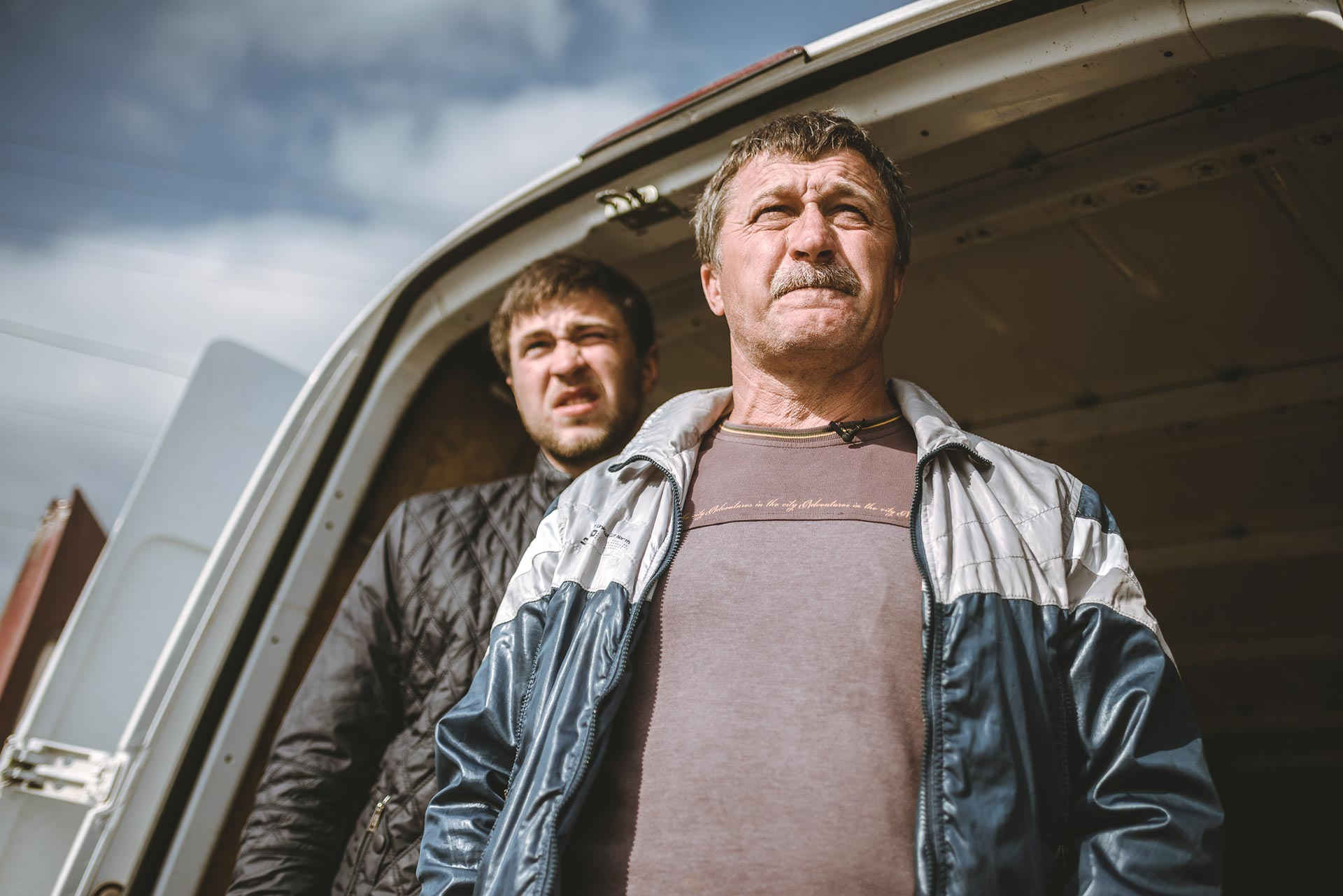
Serhii
Local farmer Serhii Kovaliov has been growing vegetables for about 20 years and this is how he earns his living. He says that this is the main way of earning money for people from the surrounding villages:
— There isn’t much money left on your personal expenses. The larger part of the income is invested back into the production. It is hard to calculate everything in advance. We do everything spontaneously, using our intuition. There are whole villages of people like me. Everybody tries to think ahead and make things work.
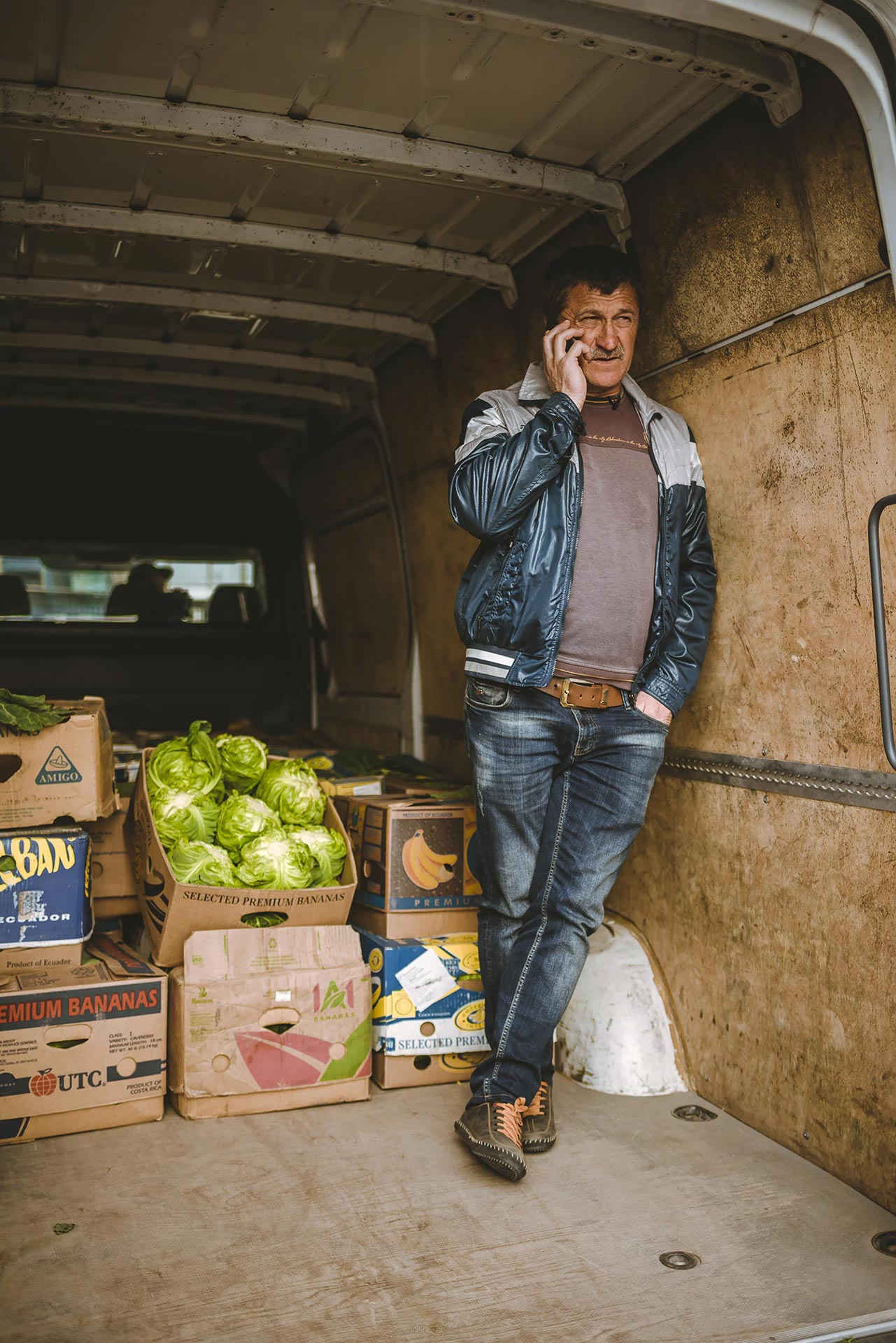
The Nezhdanyi Market hosts vendors from all the regions of Ukraine. Close proximity of the market allows local people to better understand the demand and provide more fresh products:
— It is easier to sell products in smaller amounts. A large batch will need to be broken into smaller ones to be sold. For us, it is easier as we live close to the market and we can come home and bring some more fresh cabbage. For those who come from far away, there is no other way than to transport large amounts of products at a time and divide them into smaller portions. As I said, it’s easier for us — you can load half a tonne on your truck and go to the market.
Serhii and his family try to cooperate more with their regular customers, as it is easier to come to an agreement with them:
— It is easier to work with people whom you have known for a while because we can make compromises. Life is all about a compromise. They can ask to lower the price, and then we see whether it’s suitable for us at that moment. If we come to an agreement, they may come back to us next time, not to someone else. You don’t just live one day, you have to be flexible and not stubborn. You don’t do business like that. If you feel that you are not ready to get along with people and customers, stay at home.
The Village of Velyki Kopani is situated not far from the National Park of Oleshky Sands, which is one of the largest sand expanses in Europe. Overall, this region is characterized by chestnut soils combined with slates.
— On the one hand, sandy land is favorable for farming. It does not hold water, and everything grows faster. Black soil or loam stays wet for like a week after the rain. Here everything dries in two hours. Filtration is really good and everything stays irrigated.
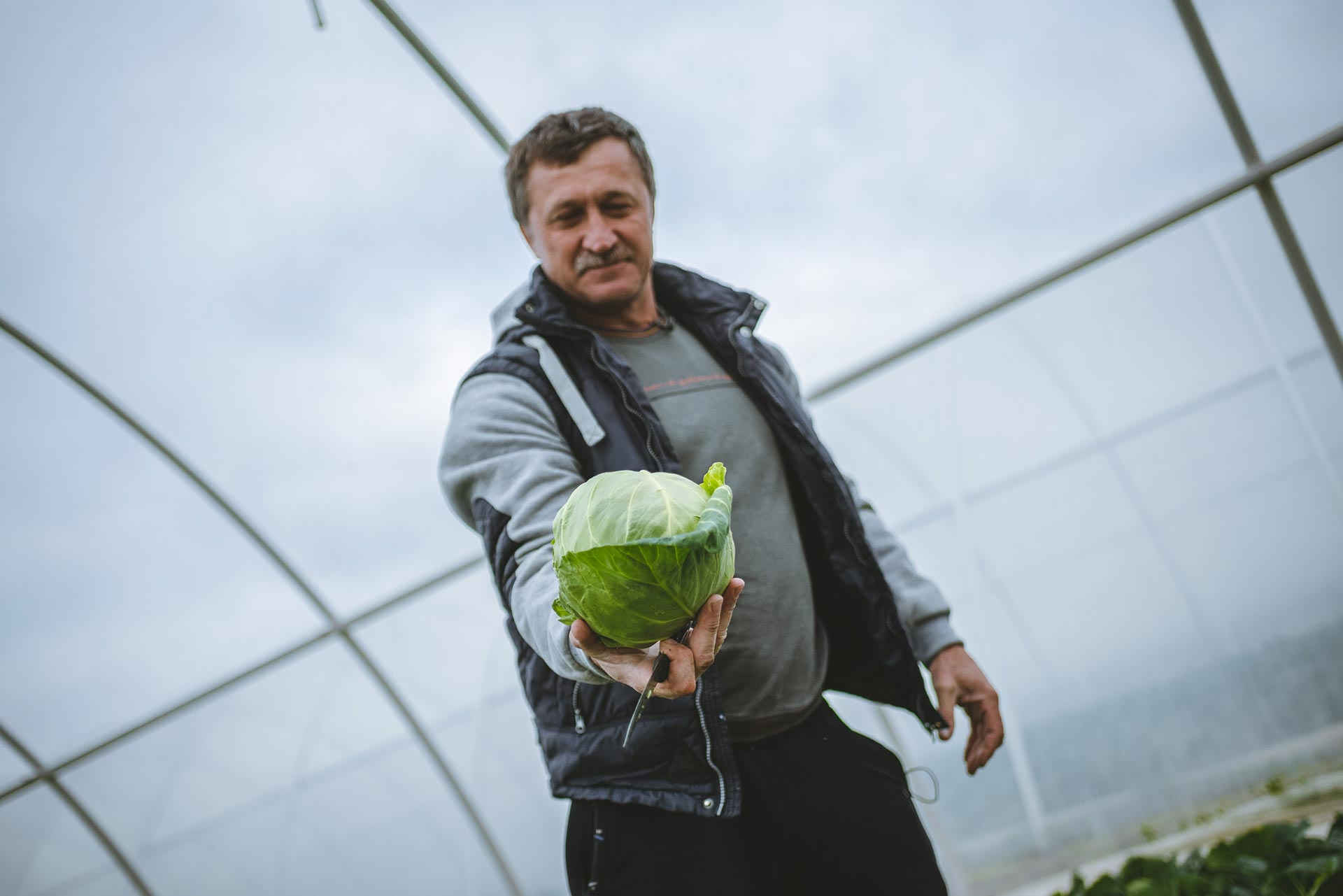
Serhii used to grow different vegetables, but in the recent years he has been mostly focused on growing cabbage, pepper, and eggplants. He does not feel like experimenting with exotic plants.
— I got used to growing cabbage you know. We tried different things but cabbage turns out the best. I was once offered to grow some products uncommon for this region, but there has to be a stable outlet for them. I want to grow vegetables that are easy to wholesale. If you have something special, it does not mean someone will buy it.
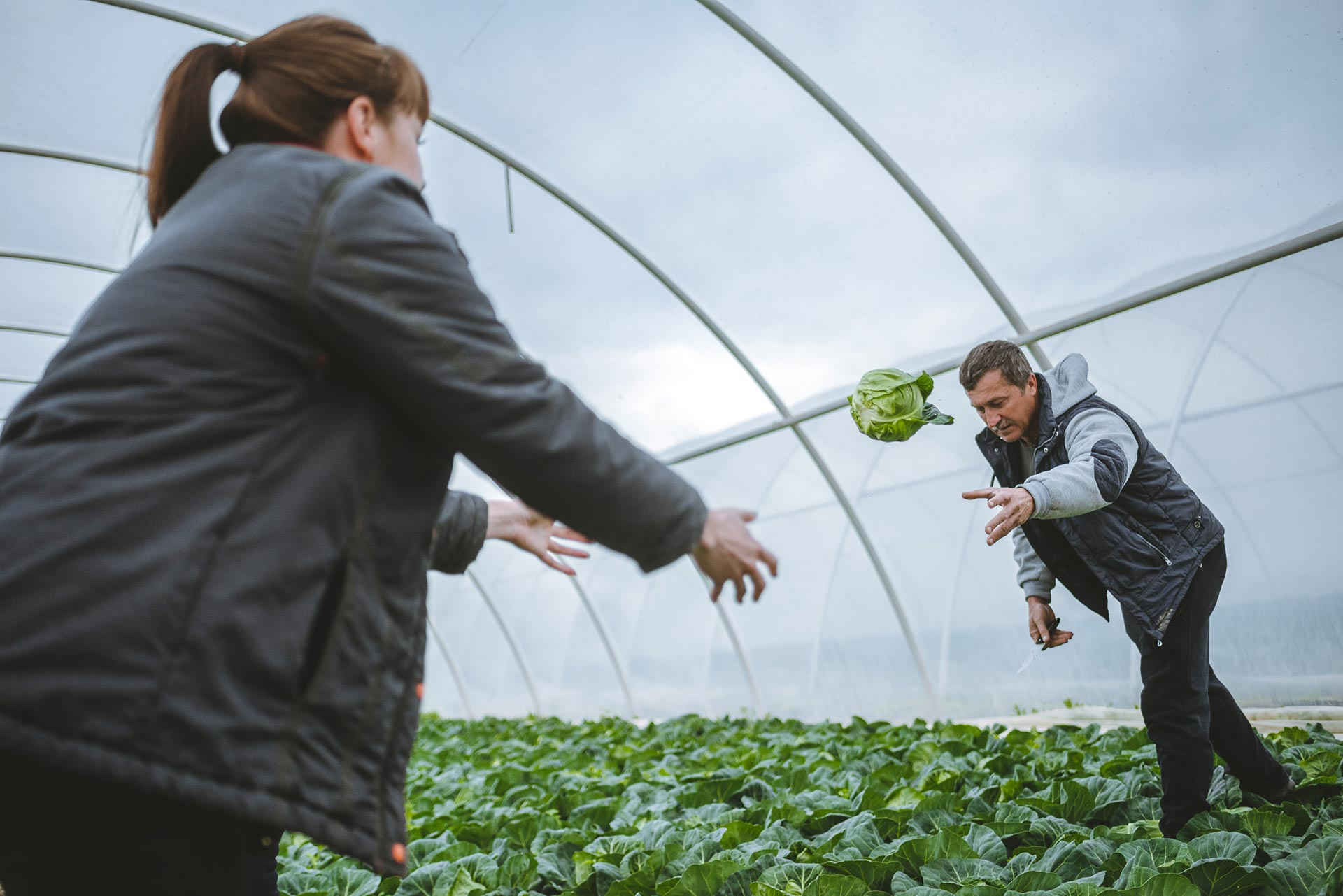
Serhii says that growing vegetables for sale is like playing the lottery. Since they go bad very quickly, you need to sell them as quick as possible. Supply and demand are never stable at the market.
— It takes a while to transport the vegetables and then you need to sell them quickly. Perishable products don’t last long. If there are two cabbages and one of them is bad, for sure the customer will pick the good one. Retailers aren’t really bothered by keeping the products, it’s all the responsibility of the producers. There is an abundance of everything on the market today and there are no seasonal fluctuations.
It happened once that they couldn’t sell the cabbage they brought, so they gave it away to the local military base:
— It happened last year. We cropped some cabbage, but no one was buying it. I told my son to take it to the military base for the soldiers to eat it. Such things happen sometimes. Usually though we sell everything.
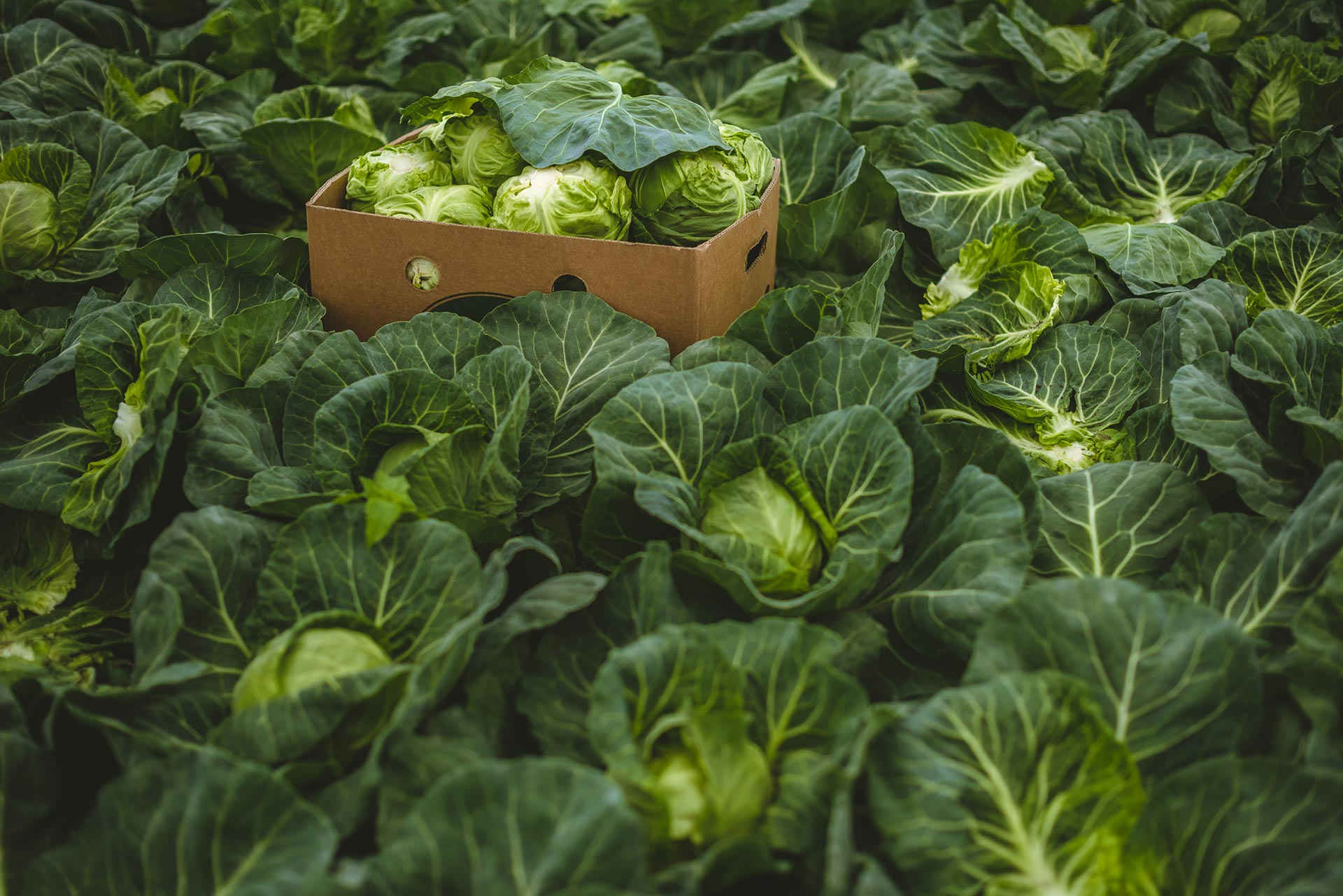
Sometimes it happens that Serhii has to go to the market several times in one day, but there are also days when he doesn’t go there at all. The man also recalls that the market has been operating the way it is now for about 20 years. Before that it used to be a place for pop-up retail.
— The market is not providing for people in the village, they have to make an effort to earn their living. To sell something on the market, you need to grow something first. Sometimes you have nothing to take to the market. The only way out here is to plough and cultivate the soil and start everything again.
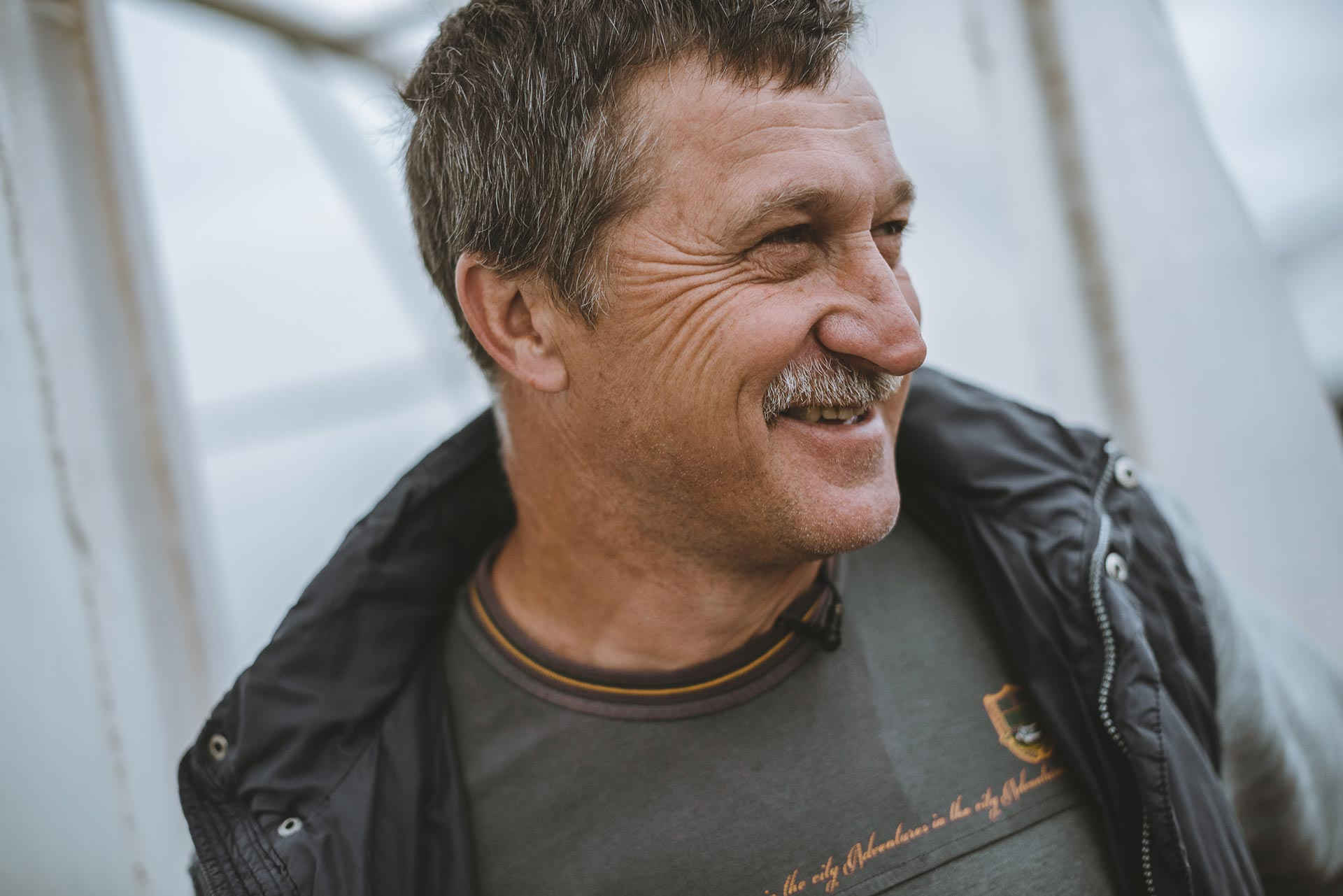
Serhii’s father was a tractor driver, the rest of the family were farmers as well. Thus, being 50 years old, the man doesn’t feel like changing his occupation:
— I believe that one has to make the key accomplishments by the age of 40 and then at the age of 50 you just have to maintain everything you’ve accomplished. I don’t want to change anything. I am in my element and I feel comfortable doing this. Besides, after you have been doing something for 20 years, you already know what’s what and you know everything in this sphere. Things seem easy for you, but be ready to win and lose, it’s like a constant searching for a balance.
Serhii used to work as a locksmith at a plant for a while. At first he was afraid to leave this job, but later on he decided to invest in his own business.
— I used to think that all I need to do is to save for retirement. However, I felt that it brings me not only money, but also joy and comfort. At first we worked on a smaller piece of land and we earned little money out of it, but we kept on growing and developing, we could not allow ourselves to slow down or stop.
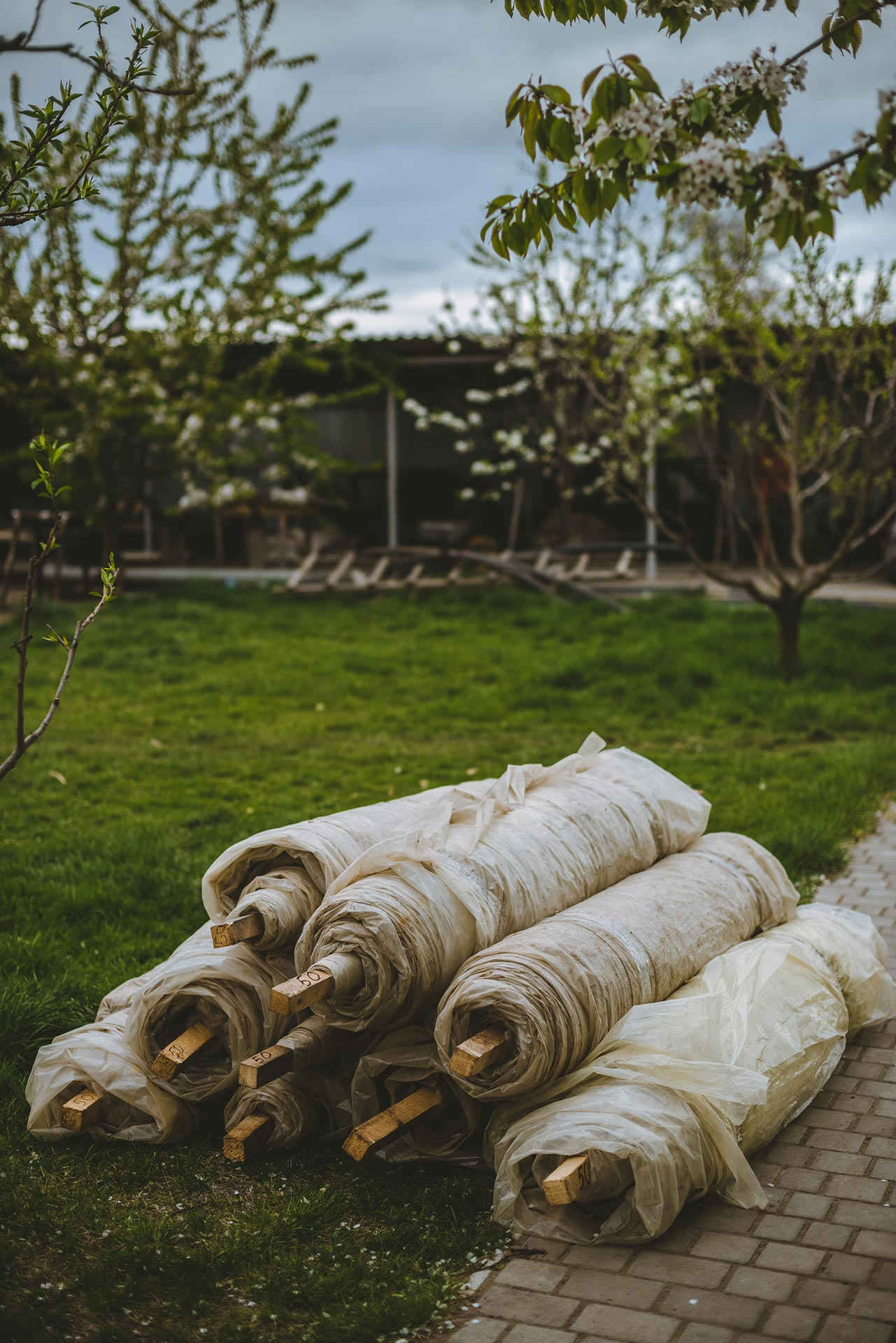
Serhii underlines the importance of financial gain which is the most pleasant part of his job. He is convinced that if the farmer is duly rewarded for what he does then the work itself brings joy.
— It is not that money is the most important thing in life, but without it you will hardly have a decent life. My business requires investments and I never know how much I will earn in the end. When I started constructing my first greenhouses, I invested all the money I had. It was scary to start a year having nothing. It is always hard to start anything from scratch.
Serhii is a father of two: his daughter is getting a degree in medicine, and his son helps him with farming. The family works from morning till night, sometimes without breaks and lunches. They are not the only family in this region living this way:
— Everybody here is involved in farming. It is not a hobby, it is a lifestyle of people in the southern regions of Ukraine. Industry is not developed here which means people don’t have many options. So if you want to survive, you should do farming.
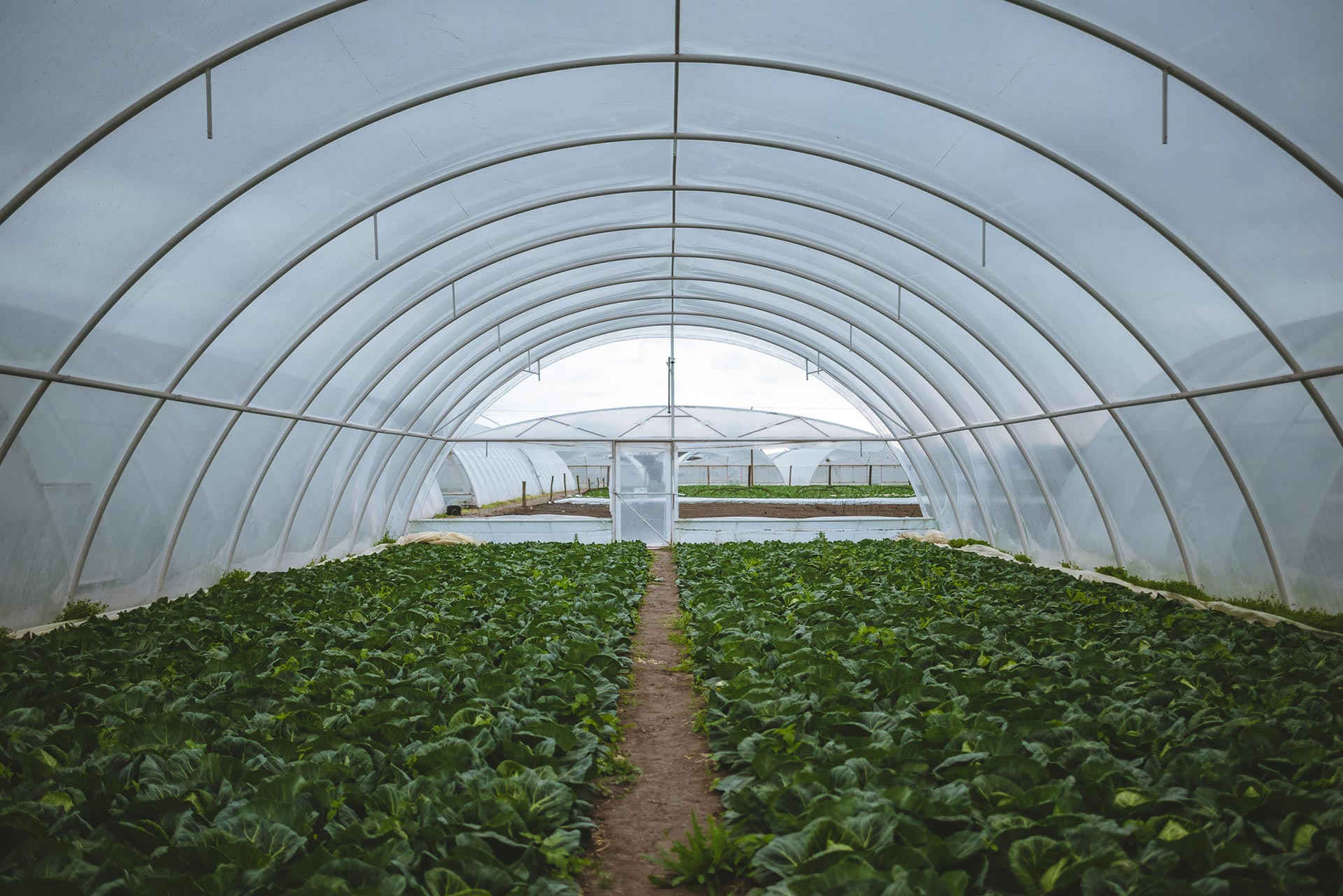
From time to time Serhii considers leasing his greenhouses and then shipping the harvested crops to the lessee. It is a common practice in Spain where you can plant your own orange tree on a rented land and have it taken care of:
— Oranges are then picked and shipped to the owner. I thought it might be a good example to follow — leasing a part of my greenhouse. I can plant a row of tomatoes, a row of cucumbers, cabbage, and strawberry and so on. Then I get paid for the lease and for taking care of whatever was planted and whenever the lessee needs fresh products I just send them. These are just thoughts to consider.
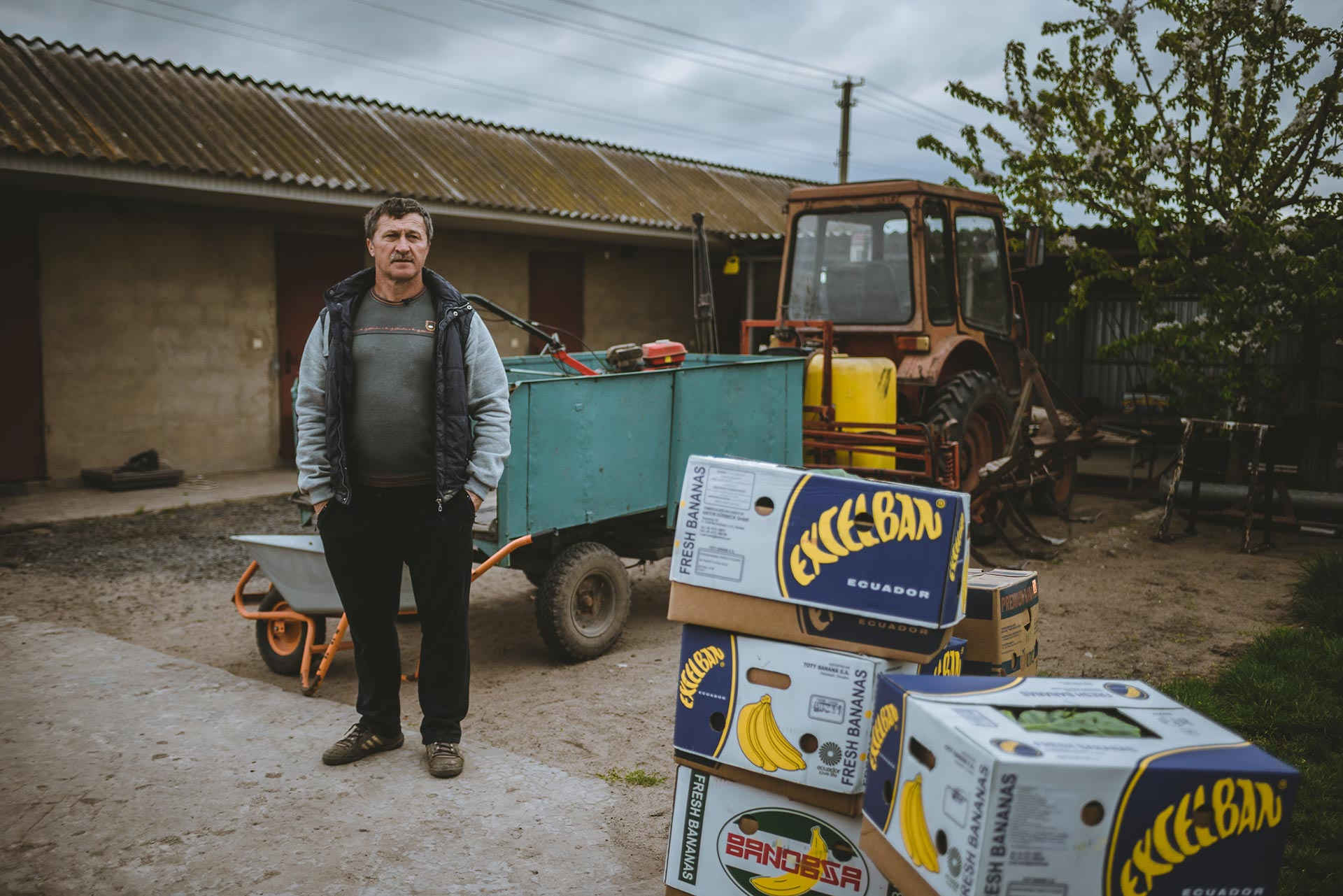
Serhii does not want to leave Ukraine. He says that just like you can’t choose your homeland, he wouldn’t want to change it either:
— It is a place where I was born. I grew up here, I live here, and I know people here. I wouldn’t be able to leave, this place is dear and near to me. This is my home.

